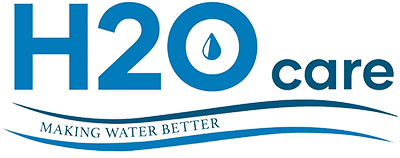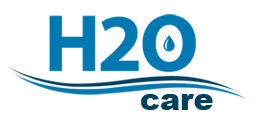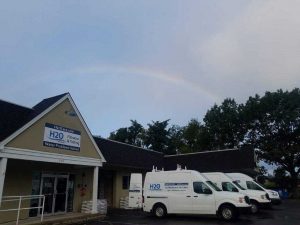WATER SOFTENER & WATER FILTRATION SYSTEMS
If your water comes from a private well and contains elevated levels of the minerals or contaminants identified later in this report, you may need a water filtration system or water softener to provide you with improved water quality. From the most recent Annual Water Quality Report, Haverhill’s public drinking water comes from a combined water source, all of which are surface water. Water is pumped from Millvale Reservoir and Crystal Lake into Kenoza Lake, where the Water Treatment Plant is located. Round Pond and Winnekenni Basin overflow into Kenoza Lake. For the complete report, see the following link: Annual H2O Quality Report.
The most common water quality issues found in private well water in Haverhill are Iron, Manganese, Radon and Arsenic. While these are mostly naturally occurring, the effects on your home’s water can either cause potential health concerns or aesthetic and other problems. For more detail on these, see below.
WATER SOFTENERS
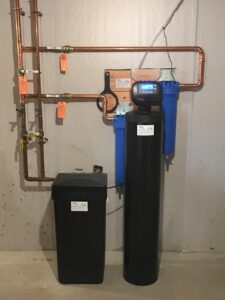
High Efficiency Water Softener
Hard water (Magnesium & Calcium), Iron and Manganese are naturally occurring minerals commonly found in New England’s water supply. Hard water is typically evidenced by white scale formation in showers, glassware, dishes and other plumbing fixtures. It can also make washing your hair and skin less than ideal as it negatively affects soaps, shampoos and detergents’ ability to clean. Additionally, it can have damaging affects on your home’s plumbing distribution system, hot water heater and other water using appliances.
Iron can show up in two forms; Dissolved in solution (ferrous form – clear water iron, can’t see until it stains) or precipitated (ferric) particulate iron which you can see in the water. Typical symptoms of iron in your water include Red/Brown stains in sinks, tub, dishwasher, laundry and/or Metallic taste. Iron may also show up in the form of Iron bacteria. Although harmless, iron bacteria can form gelatinous growths that my plug pipes or break free in slugs of dirty iron-laden water with unpleasant tastes and odors. The EPA drinking water regulations set a recommended secondary maximum contaminant level of iron at .3 milligrams per liter. The reason they call it a secondary contaminants is that iron isn’t considered a primary health threat. See the link at Iron Article in Water Technology Magazine for more information on Iron in water and related water filtration challenges. A water softener will be effective in removing dissolved iron from the water. A water softener will also remove hard water minerals and provide you with soft water for cleaning, bathing, etc. An “up-flow” water softener is recommended for water that contains high levels of dissolved iron as the contaminant can build up in the lower section of the softener over time with down-flow systems. A water treatment professional can explain this more fully. Sediment filters are effective in removing particulate iron from the water and would typically be installed before the water softener.
Manganese similarly shows up dissolved in solution or precipitated (particulate) which you can see in the water. Typical symptoms of manganese in your water include brownish-black staining in the dishwasher and other plumbing fixtures. Manganese may also show up in the form of manganese bacteria. Although harmless, manganese bacteria can form gelatinous growths that my plug pipes or break free in slugs of dirty manganese-laden water with unpleasant tastes and odors. The U.S. EPA drinking water regulations set a recommended secondary maximum contaminant level of manganese at .05 milligrams per liter. Manganese is also considered a secondary health threat, however at certain high levels, especially in children, can be a health threat. For more information on this topic, see the link at Manganese Article in Water Tech Magazine. As with Iron, a water softener will be effective in removing dissolved manganese from the water. Also as with Iron, an up-flow water softener is recommended to prevent potential build up in the lower section of the water softener.
BAD ODORS & TASTE IN WATER
For more on the removal of bad odors and tastes in water, such as fishy, metallic, musty, etc., see the link at https://h2ocare.com/bad-odor-taste-water/.
RADON & ARSENIC IN PRIVATE WELLS
Radon typically originates in deep wells that tap radon contaminated groundwater. It is impossible to detect radon gas without appropriate and properly taken laboratory water tests. The gas releases into air when water is turned on in your home via showers, faucets, dishwashers, washing machines, etc. If radon is present in your home’s water, it may also be present in the air and should be tested accordingly. Radon can be a serious health threat. For more information, see the link at: Radon in Water Article. Water filtration systems that effectively remove radon from water will include a sealed, agitation chamber that churns the water to release the radon gas, and then vents it safely outside. The vent must be installed to release the gas at a high enough level outside of the home to allow it to safely mix with ambient air. This proper venting is critical to a safely designed system.
Arsenic can have severe health consequences as it has been linked to cancer. The maximum allowable level of Arsenic in drinking water per the EPA is .01 mg/L (milligrams per liter) or 10 parts per billion. For more information on this see the link at Mass DEP Arsenic Link. Depending on the level of arsenic found in the water, certain sized tanks are filled with arsenic-specific media that will grab the arsenic out of the water. Proper installation and maintenance is critical, but these systems are very effective and proven.
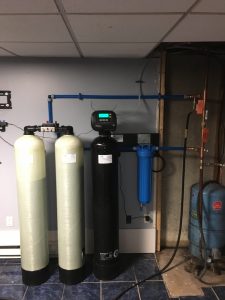
Twin Arsenic system with Ozone
